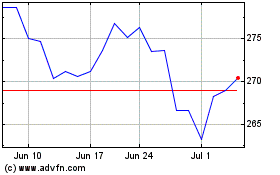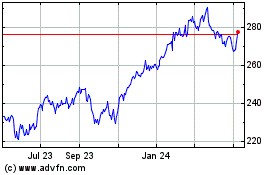By Erich Schwartzel
On the evening of Feb. 4, 2022, an opening ceremony in Beijing
is scheduled to kick off the Winter Olympics, the second time in 14
years the Games will be held in China. But more than medals will be
on the line. The 2022 Games highlight a dilemma facing potential
sponsors: Risk association with an authoritarian regime, or forgo a
much-needed chance at a star turn on the global stage?
Major companies are eager to get in on the action. Visa Inc.,
Coca-Cola Co. and a host of other businesses will be represented in
Beijing as "Olympic Partners," the highest level of sponsorship
available, a tier that covers several Games cycles and is reserved
for those writing the biggest checks and launching the most
aggressive tie-in marketing campaigns. Mars-Wrigley will be there,
too, handing out Snickers, "the official chocolate of the 2022
Winter Olympics and Paralympic Games."
What might have seemed like a no-brainer -- backing a popular
sporting event in a country with 1.4 billion consumers -- may turn
out to be a high-risk gamble. The Olympics could mark the crescendo
of a yearslong trend of some consumers, advocates and Western
lawmakers pointing out what they consider the true costs of working
with a country where horrifying human-rights abuses have been
cataloged by journalists and U.S. officials. At a time when global
companies rely more heavily than ever on the Chinese market, its
government has proven easily triggered by the slightest criticism
-- and unafraid to exact economic punishment on those who cross it
politically.
Already advocates are asking Airbnb Inc., another Olympic
Partner, why its lodging is available in a country where Uighurs in
the province of Xinjiang are housed in concentration camps,
subjected to forced labor and other abuses.
Airbnb is one of many companies that tout themselves as
corporate models of social responsibility, highlighting volunteer
programs and nonprofit outreach in ways that are increasingly a
consideration for consumers deciding how and where to spend their
money. When it comes to China, such activists say, the company
appears to be less concerned.
"Airbnb is very big on social issues, but they are selective on
which social issues," said Zumretay Arkin, the program and advocacy
manager at the World Uyghur Congress, an organization committed to
raising awareness of the minority's plight.
Such criticism presents a Catch-22: It demands an answer from
firms like Airbnb -- but an answer that even alludes to the
existence of Uighur concentration camps could be enough to threaten
its business in China. An Airbnb spokesman declined to comment.
Sports and politics in China have proven a combustible mix in
the past. Just ask the National Basketball Association, still
struggling to regain full access to the market after the Houston
Rockets' general manager tweeted support for pro-independence
activists in Hong Kong in 2019.
In the wake of China's response, prominent players and coaches
withheld criticism and in some cases supported China. Chinese
broadcasts of NBA games were canceled, and sponsorship deals ended
totaling millions of dollars. A state-run network resumed
broadcasting NBA games only last October, a year after the
offending tweet.
In the case of the NBA and other sports, a comment by one person
made an entire organization radioactive, and that could put
Olympic-affiliated companies in a bind. Revenues for Nike Inc., for
instance, grew 24% in China last quarter, compared with 1% in North
America. Behind those sales lies a China-based supply chain
essential to making its entire global operation work.
What, then, might happen to an Olympian's corporate sponsor if
she lands in Beijing and speaks out in support of the Uighurs?
Given China's modus operandi in such matters, shutting up is
likely to be encouraged. Chinese officials reject allegations of
human-rights abuses, and have characterized the camps as vocational
schools. And it's not just the Uighurs to whom advocates will be
drawing attention -- support groups for Tibet and Hong Kong have
also parlayed the Games into an opportunity to raise awareness of
their causes. The Olympic Charter prohibits "demonstration or
political, religious or racial propaganda" at Olympic sites, but in
December the U.S. Olympic & Paralympic Committee said it
wouldn't punish American athletes who protest at the Games.
Some sponsors are hoping the globalized romanticism of the Games
will supersede messy political realities. "We strongly support the
Olympics' vision of building a better world through sport," a
Mars-Wrigley spokeswoman said.
But there are significant unknowns to consider. China's
crackdown on protests in Hong Kong in 2019 caught popular U.S.
businesses in the middle. Protesters targeted Starbucks Corp.
storefronts in Hong Kong, believing the company's local franchisee
supported Beijing. Apple Inc. removed an app used by protesters --
for what the company said were public-safety reasons -- and faced
criticism it was helping the Chinese authorities.
What if similar protests are timed to the 2022 Games? Or if
China, in the 12 months before the Games are to begin, makes an
aggressive move toward Taiwan, a development some believe would
necessitate a U.S. response?
Businesses, meanwhile, are desperate for a ratings bonanza.
Stay-at-home orders have driven more consumers to platforms like
Netflix, which don't carry advertising, making the prospect of a
live broadcast event all the more tantalizing.
There's an appropriate precedent to consider: The case of Mesut
Özil, a midfielder with England's Arsenal soccer club. In late
2019, he posted a comment to his social media accounts decrying the
Uighur internment camps.
Arsenal's next game went off the air in China -- and when
matches resumed, Chinese commentators pretended Özil wasn't on the
field. Özil's avatar disappeared from the Chinese versions of
soccer videogames.
It was professional soccer's China 101 moment. In Hollywood,
several movies that have drawn the ire of Chinese officials taught
everyone to avoid the "three T's": Tibet, Taiwan and Tiananmen
Square.
When choosing Beijing, the International Olympic Committee had
only controversial options. In 2015, when the location of the 2022
Games was being decided, Oslo, Krakow, and Stockholm had dropped
out, leaving just one competitor for Beijing: Almaty,
Kazakhstan.
The IOC opted for "the devil they knew," said Mandie McKeown,
the executive director of the International Tibet Network, who
organized a letter from more than 180 human-rights organizations
calling on governments to boycott the Games.
President Biden has indicated he would not support a boycott
that would stop American athletes from attending. Relocation isn't
in the cards, either.
"We have exhausted that route, so we are going to focus on
corporate sponsors," said Ms. Arkin.
The market forces dependent on the 2022 Games and its host
country at large may prove resilient.
Money talks. Or in this case, keeps silent.
Write to Erich Schwartzel at erich.schwartzel@wsj.com
(END) Dow Jones Newswires
February 12, 2021 11:14 ET (16:14 GMT)
Copyright (c) 2021 Dow Jones & Company, Inc.
Visa (NYSE:V)
Historical Stock Chart
From Mar 2024 to Apr 2024

Visa (NYSE:V)
Historical Stock Chart
From Apr 2023 to Apr 2024
